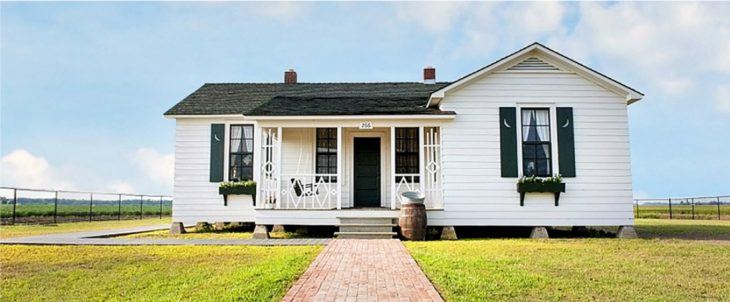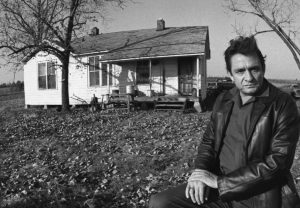Johnny Cash celebration begins at the Dyess Colony
by October 19, 2017 10:59 am 801 views

The restored Cash home in the Dyess Colony.
One of the premiere celebrations in Arkansas is set to begin Thursday (Oct. 19) in rural Mississippi County. The Johnny Cash Heritage Festival, honoring hall of fame musician and Arkansan Johnny Cash will be held at the Dyess Colony, in Dyess. It’s the location of Cash’s boyhood home. Two of his siblings, Joanne and Tommy Cash, and his daughter, Rosanne Cash will attend.
A symposium, free to the public, will have several presentations followed by the KASU Music Nights of regional music in the Dyess Colony Circle. Other events include a Memories of a Lifetime oral history project, food vendors, and arts and crafts booths throughout the three days. Food and other purchases are cash only.
The cotton field concert will begin at 12:15 p.m. on Saturday. Grammy Award-winning artists Rosanne Cash and Kris Kristofferson, along with Joanne and Tommy Cash, and Buddy Jewel.
Arkansas Parks and Tourism Executive Director Kane Webb previously told Talk Business & Politics the state’s musical heritage is a growing part of the tourism sector, which is the fastest growing sector in the state’s economy he said. The Dyess Colony, the place where Cash grew up, may become a mainstay attraction in the Natural State, he said.
“We really think it could become an international destination,” Webb said.
How the Cash family came to this desolate spot in rural Northeast Arkansas was a common story during a harsh bit of history. Drought, sporadic floods, and the Great Depression decimated family farms in the early 1930s. President Franklin Roosevelt started what was then called a socialistic plan to help many of these farmers in eastern Arkansas.
Ray and Carrie Cash brought their family to the Dyess Colony in 1935, according to historians. The Cashes moved to Dyess with their five children, Roy, 13; Louise, 11; Jack, 5; J. R., 3; and Reba, 1. Joanne and Tommy were born in Dyess.
During that era, the area was more swamp than usable farm ground. Workers drained the swamp and 500 farm families, including the Cash family received 40 acres and a mule through a federal government aid program. Rice and cotton were grown. Johnny Cash, along with his brother, Jack, worked the family farm and attended school. Work in the fields was grueling. At night, Johnny and Jack spent a lot of time in their room.

Their father, Ray was a strict disciplinarian who worked extremely hard, Joanne said. The children toiled in the cotton fields alongside their parents, she said. Johnny, along with his siblings, was raised in humble circumstances and the Cash children were taught to work for what they earned, she said.
Jack died in a wood cutting accident as a youth. Music historians attribute Cash’s dark, brooding style to his brother’s unexpected death. Johnny served in the military after high school. He came home periodically to visit his parents. They moved to Memphis in 1956. Cash returned to his old homestead years after he became internationally famous with songs such as “Folsom Prison Blues,” “Walk the Line,” “Ring of Fire,” and others.
His battles with drug and alcohol were well documented, and he is often referred to as “The man in black,” a reference to his all black clothing attire he wore during performances.
ASU began restoration on the Cash childhood home in 2011. The dwelling was restored to its original condition, and an administrative building built into the old Colony theatre. The project cost about $3.5 million. The heritage festival began after a series of successful concerts were held at the ASU Convocation Center starting in 2011 honoring Johnny Cash’s legacy. The next phase of the project will include rebuilding the outbuildings at the Cash farmstead, including the barn, smokehouse, chicken coop, and privy, according to ASU.
